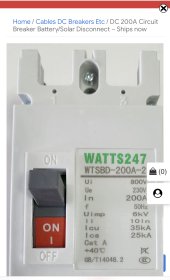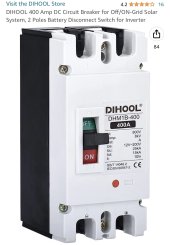New member here. I'm planning a solar arrangement for my 4WD Suburban that I use for camping and photography excursions and have just begun acquiring parts. I notice on some 12V system videos that some attach a fuse directly to battery positive terminal, even though the pos cable terminates at a circuit breaker before outputting to the appliances (MPPT, inverter, fuse block, etc.). I plan on using an SOK 12V/100aH LiFePO4 battery connected to a 175A breaker. Do I still need a large fuse at the battery terminal, or is this overkill? If the fuse is needed in addition to the breaker, why? Thanks for any help.
You are using an out of date browser. It may not display this or other websites correctly.
You should upgrade or use an alternative browser.
You should upgrade or use an alternative browser.
Circuit Breaker AND Fuse?
- Thread starter PhotogTX
- Start date
Tomthumb62
Solar Wizard
- Joined
- Sep 25, 2022
- Messages
- 1,871
Breakers are notoriously unreliable. Either fuse only or fuse and breaker. Don’t flip the breaker under load. If you do, replace it.
Thanks...hadn't thought of it that way. I just assumed brand-name breakers such as Bussman or Blue Sea wouldn't have too many concerns, but a safeguard such as the fuse would be a good idea now that you mention it. Thanks again.Breakers are notoriously unreliable. Either fuse only or fuse and breaker. Don’t flip the breaker under load. If you do, replace it.
This is a pretty broad generalizations that is not correct. There are plenty of breakers out there that are fully rated even for turning off under full load and specify in their spec sheets how many times it will survive. You must be talking more about the no-name stuff on Amazon that can be really flaky,Breakers are notoriously unreliable. Either fuse only or fuse and breaker. Don’t flip the breaker under load. If you do, replace it.
I try to stick with the brand names. I have several Bussmann breakers to choose from. But with a 1500W inverter, I plan to use a 175W fuse on the battery lug with a 175W breaker downstream...unfortunately Bussmann's largest surface mount is a 150W, but they do carry a 200A marine rated breaker. Not sure if that would be okay to go with or overkill.This is a pretty broad generalizations that is not correct. There are plenty of breakers out there that are fully rated even for turning off under full load and specify in their spec sheets how many times it will survive. You must be talking more about the no-name stuff on Amazon that can be really flaky,
There are some good breakers on Amazon. Looks to be exactly the same as the kind that Watt24/7 sells, just badged for Watts. I’ve opened the Watts up and I was very impressed by its build. Also use T class fast blow fuses and only use the Blue Sea 5502 holder for those. Lots of junk fuse holders out there.This is a pretty broad generalizations that is not correct. There are plenty of breakers out there that are fully rated even for turning off under full load and specify in their spec sheets how many times it will survive. You must be talking more about the no-name stuff on Amazon that can be really flaky,


Tomthumb62
Solar Wizard
- Joined
- Sep 25, 2022
- Messages
- 1,871
Yes it was pretty broad generalization. But call and ask Blue Seas if their breakers are rated for repeated flipping under heavy load. Once twice or a few times, but not as a switch. Turn off loads and then flip. But the unreliable nature has a lot to do with how many people use them improperly. Not knowing the experience level of the OP, I suggested the more conservative approach of only using fuses.This is a pretty broad generalizations that is not correct. There are plenty of breakers out there that are fully rated even for turning off under full load and specify in their spec sheets how many times it will survive. You must be talking more about the no-name stuff on Amazon that can be really flaky,
Last edited:
Tomthumb62
Solar Wizard
- Joined
- Sep 25, 2022
- Messages
- 1,871
Thanks...hadn't thought of it that way. I just assumed brand-name breakers such as Bussman or Blue Sea wouldn't have too many concerns, but a safeguard such as the fuse would be a good idea now that you mention it. Thanks again.
Those are good brands, but still shouldn’t be flipped manually under load. If it flips automatically more than once, I’d replace it. I find fuses just easier to deal with. Ymmv
byteharmony
Sunny side up please.
I wonder the same thing myself.Given the comments about not using these breakers as switches, I'm curious how you respond to all the 48v rack batteries with "breakers" as on/off switches?
Similar threads
- Replies
- 3
- Views
- 250
- Replies
- 4
- Views
- 269
- Replies
- 4
- Views
- 245
- Replies
- 0
- Views
- 277


